
non-ai-licenses
This repository contains software licenses that restrict software from being used in AI training datasets or AI technologies.
Stars: 142
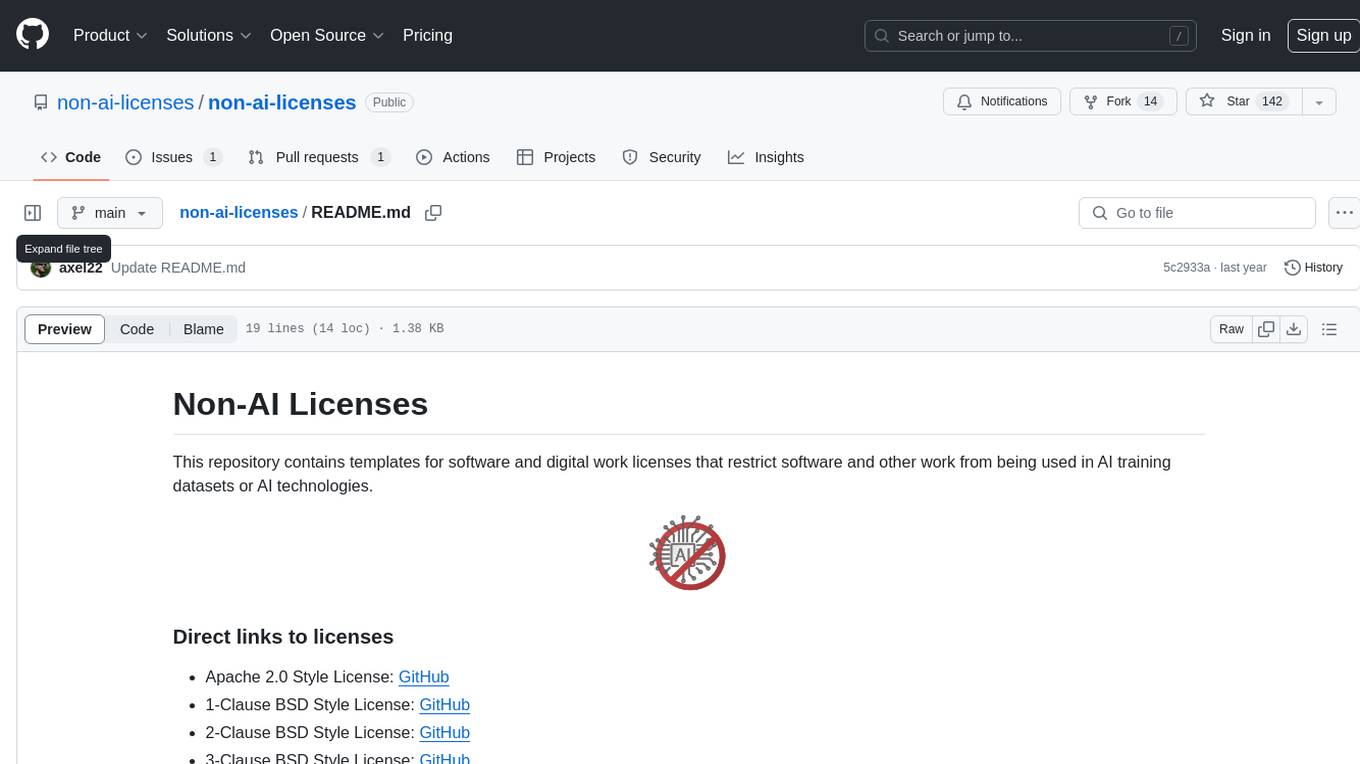
This repository provides templates for software and digital work licenses that restrict usage in AI training datasets or AI technologies. It includes various license styles such as Apache, BSD, MIT, UPL, ISC, CC0, and MPL-2.0.
README:
This repository contains templates for software and digital work licenses that restrict software and other work from being used in AI training datasets or AI technologies.
For Tasks:
Click tags to check more tools for each tasksFor Jobs:
Alternative AI tools for non-ai-licenses
Similar Open Source Tools

non-ai-licenses
This repository provides templates for software and digital work licenses that restrict usage in AI training datasets or AI technologies. It includes various license styles such as Apache, BSD, MIT, UPL, ISC, CC0, and MPL-2.0.
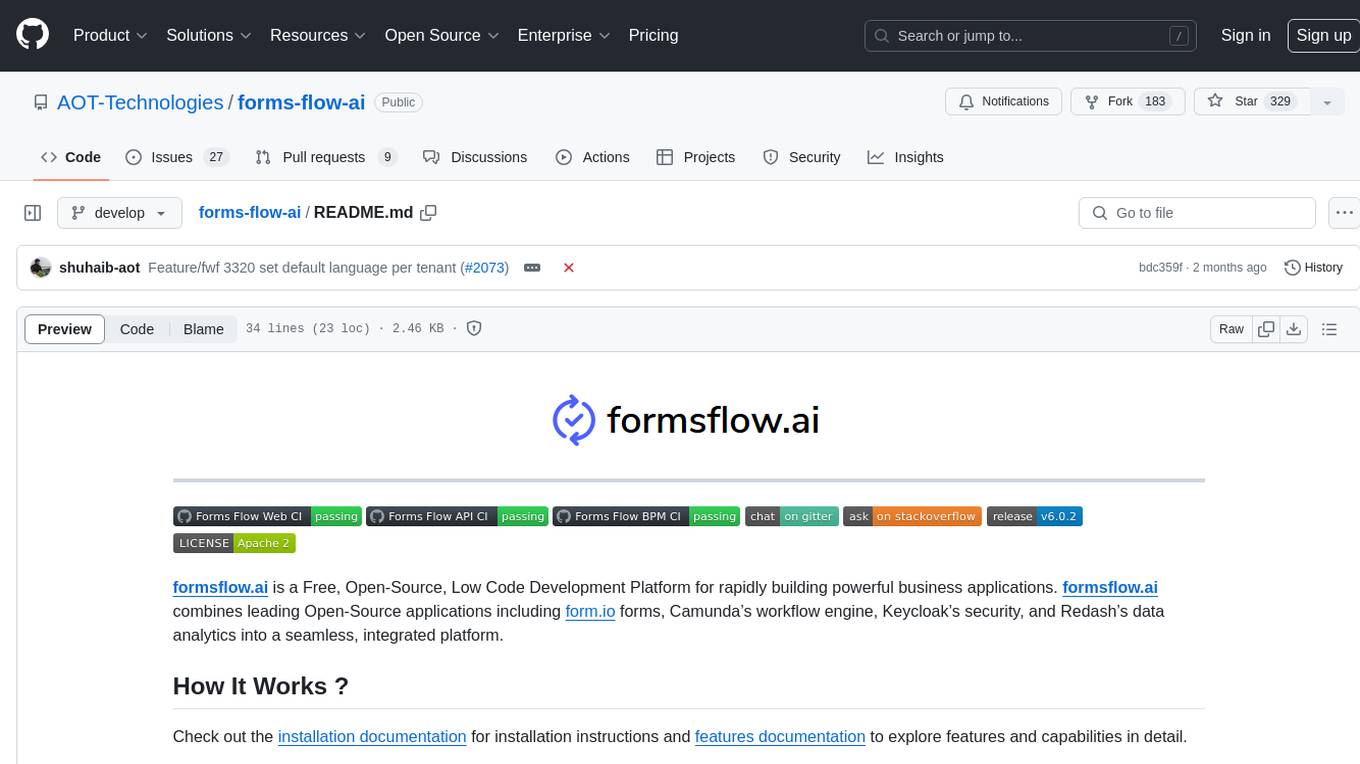
forms-flow-ai
formsflow.ai is a Free, Open-Source, Low Code Development Platform for rapidly building powerful business applications. It combines leading Open-Source applications including form.io forms, Camunda’s workflow engine, Keycloak’s security, and Redash’s data analytics into a seamless, integrated platform. Check out the installation documentation for installation instructions and features documentation to explore features and capabilities in detail.
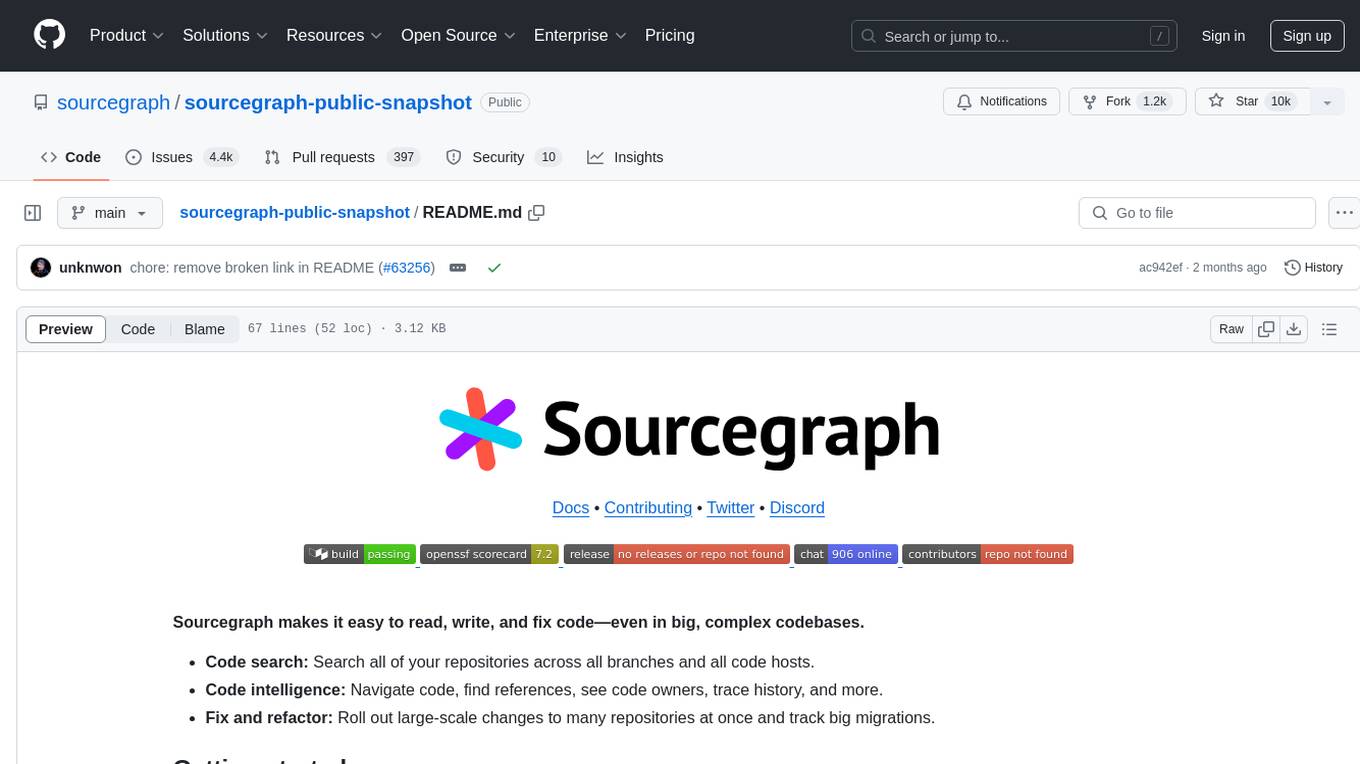
legacy-sourcegraph
Sourcegraph is a tool that simplifies reading, writing, and fixing code in large and complex codebases. It offers features such as code search across repositories and hosts, code intelligence for navigation and references, and the ability to roll out large-scale changes and track migrations. Sourcegraph can be used on the cloud or self-hosted, with public code search available on Sourcegraph.com. The tool provides high-level architecture documentation, database setup best practices, Go and documentation style guides, tips for modifying the GraphQL API, and guidelines for contributing.
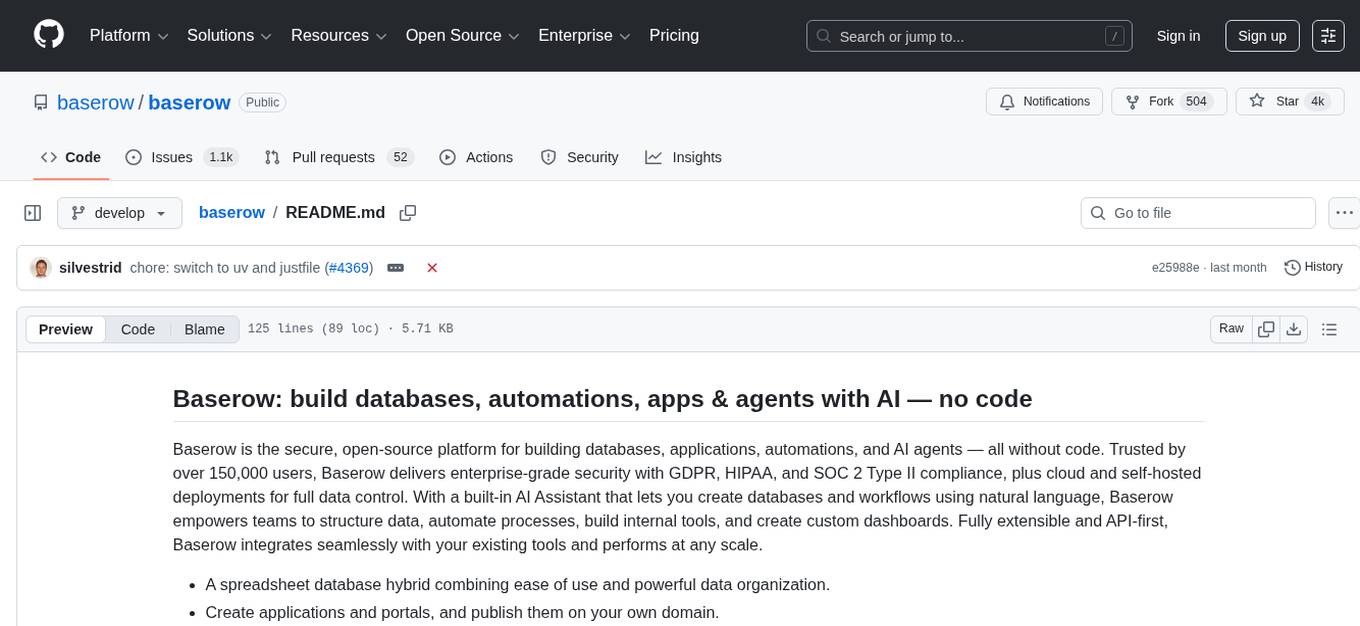
baserow
Baserow is a secure, open-source platform that allows users to build databases, applications, automations, and AI agents without writing any code. With enterprise-grade security compliance and both cloud and self-hosted deployment options, Baserow empowers teams to structure data, automate processes, create internal tools, and build custom dashboards. It features a spreadsheet database hybrid, AI Assistant for natural language database creation, GDPR, HIPAA, and SOC 2 Type II compliance, and seamless integration with existing tools. Baserow is API-first, extensible, and uses frameworks like Django, Vue.js, and PostgreSQL.
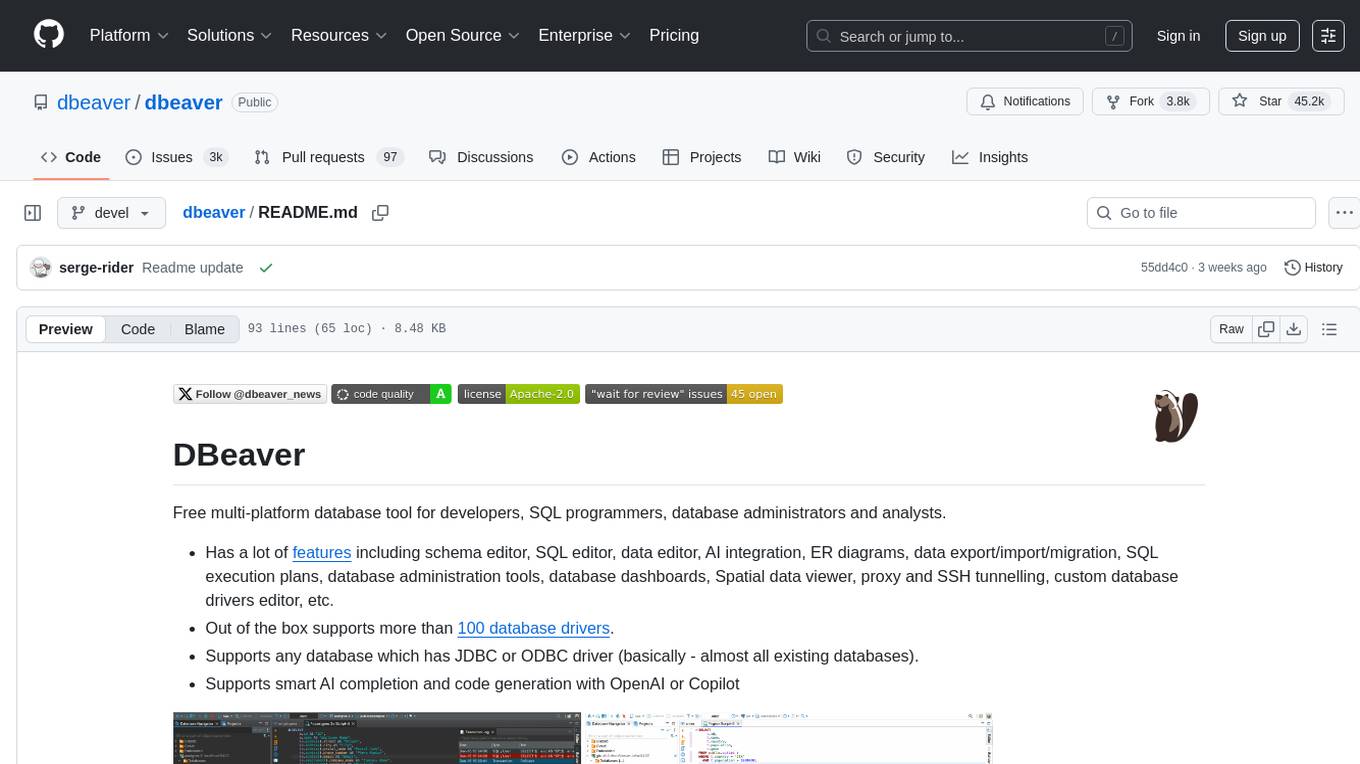
dbeaver
DBeaver is a free multi-platform database tool designed for developers, SQL programmers, database administrators, and analysts. It offers a wide range of features including schema editor, SQL editor, data editor, AI integration, ER diagrams, data export/import/migration, SQL execution plans, database administration tools, database dashboards, Spatial data viewer, proxy and SSH tunnelling, custom database drivers editor, etc. It supports over 100 database drivers out of the box and is compatible with any database that has a JDBC or ODBC driver. DBeaver also supports smart AI completion and code generation with OpenAI or Copilot.
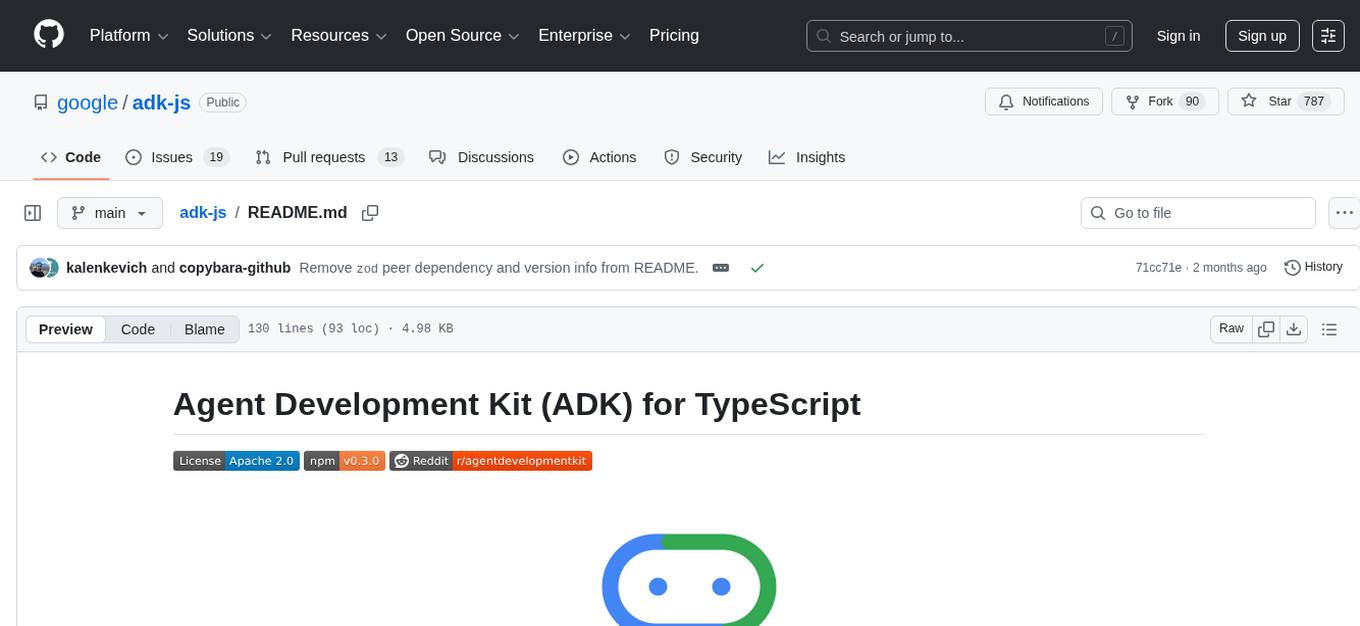
adk-js
Agent Development Kit (ADK) for TypeScript is an open-source toolkit designed for developers to build, evaluate, and deploy sophisticated AI agents with flexibility and control. It allows defining agent behavior, orchestration, and tool use directly in code for robust debugging, versioning, and deployment. With rich tool ecosystem, code-first development, and modular multi-agent systems, ADK offers tight integration with the Google ecosystem and enables the creation of scalable applications by composing multiple specialized agents into flexible hierarchies.
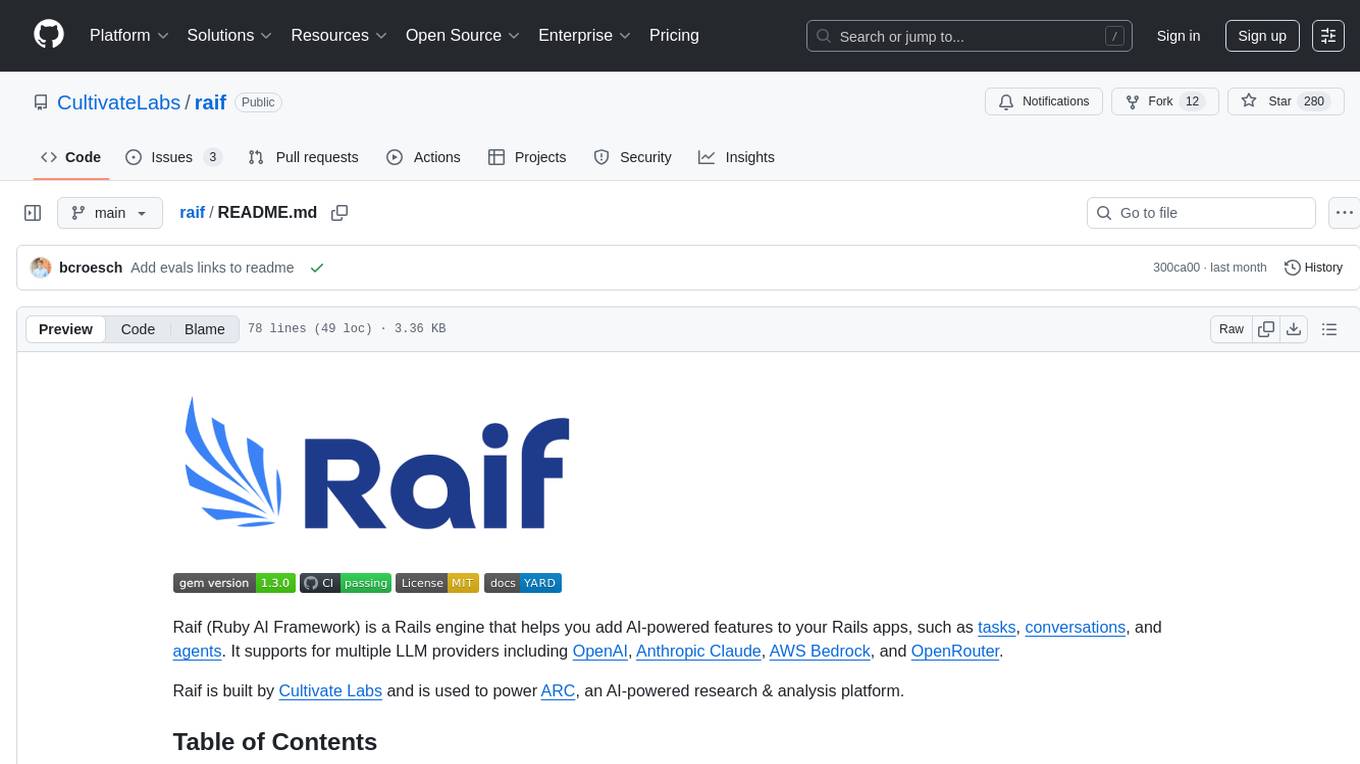
raif
Raif is a lightweight Python library for analyzing text data. It provides functionalities for text preprocessing, feature extraction, and text classification. With Raif, users can easily clean and preprocess text data, extract relevant features, and build machine learning models for text classification tasks. The library is designed to be user-friendly and efficient, making it suitable for both beginners and experienced data scientists.
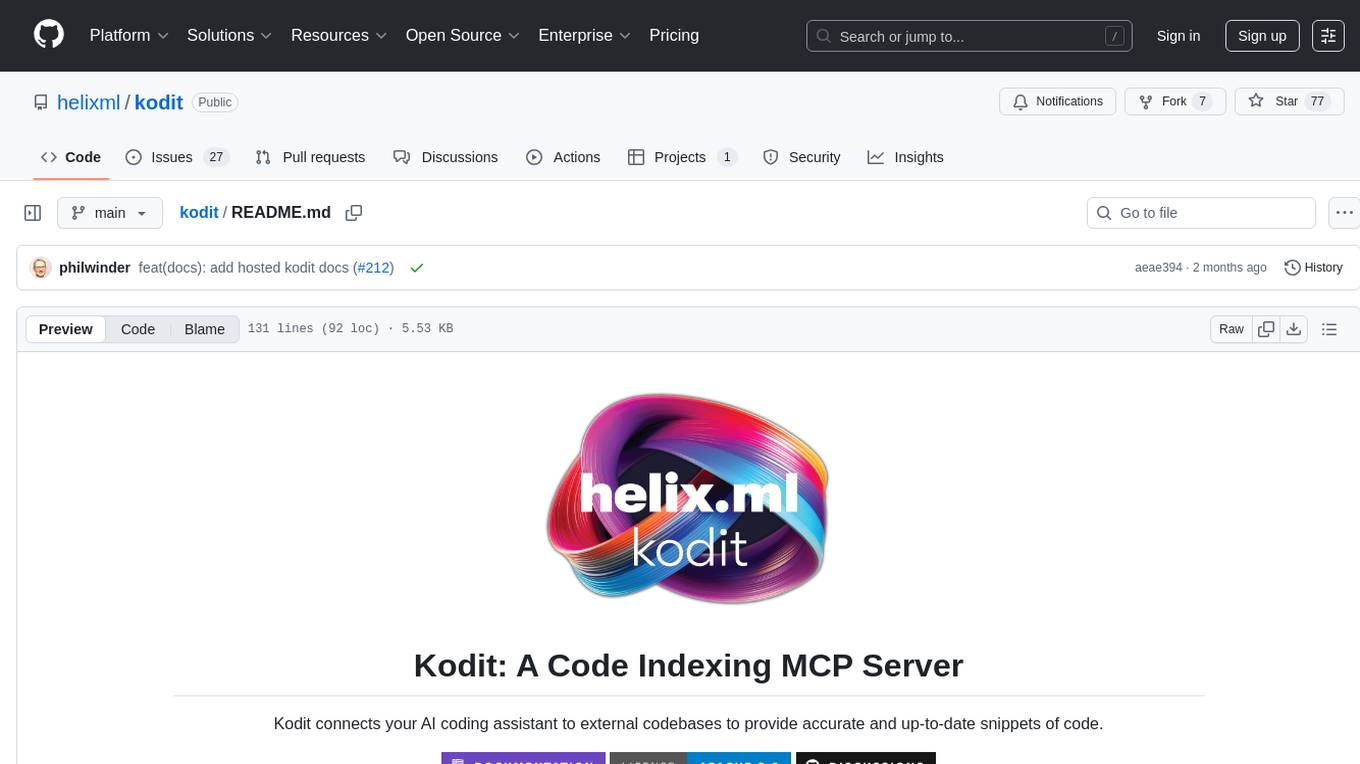
kodit
Kodit is a Code Indexing MCP Server that connects AI coding assistants to external codebases, providing accurate and up-to-date code snippets. It improves AI-assisted coding by offering canonical examples, indexing local and public codebases, integrating with AI coding assistants, enabling keyword and semantic search, and supporting OpenAI-compatible or custom APIs/models. Kodit helps engineers working with AI-powered coding assistants by providing relevant examples to reduce errors and hallucinations.
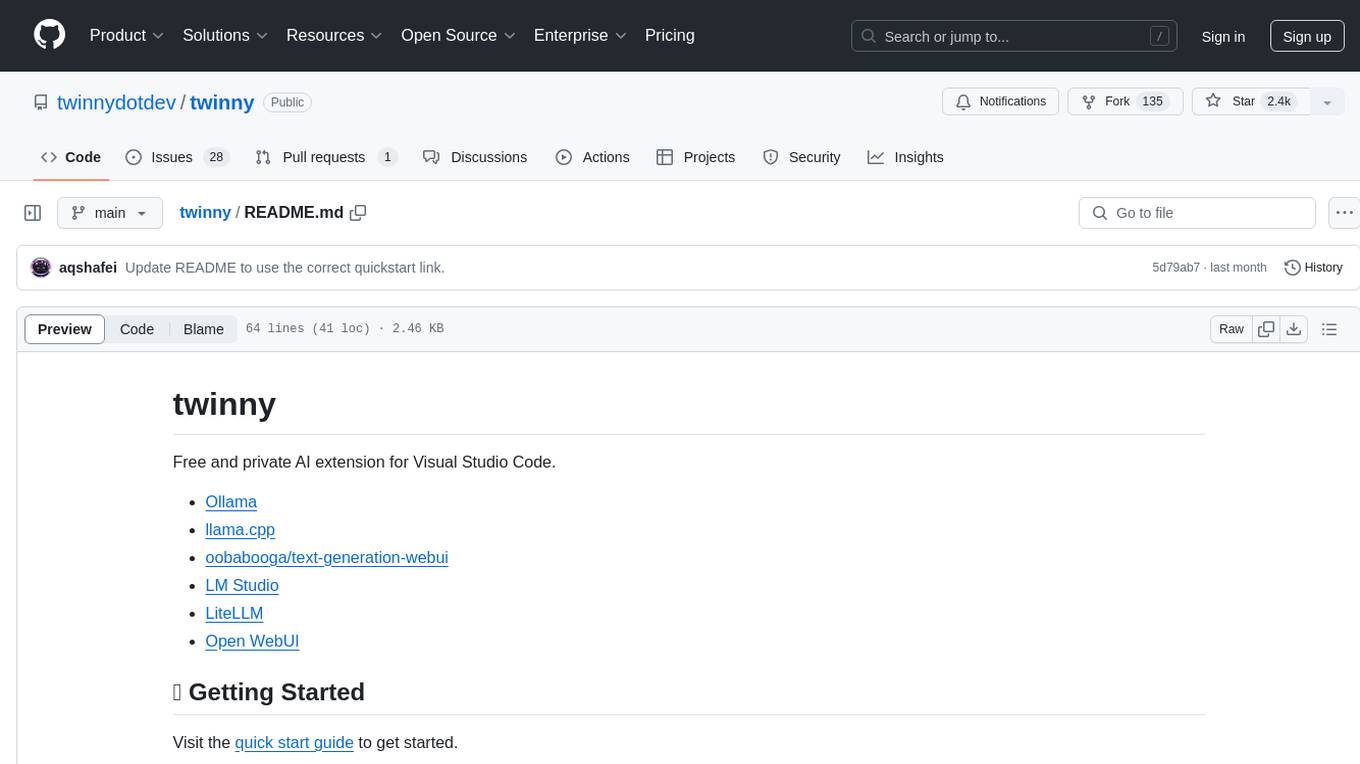
twinny
Twinny is a free and private AI extension for Visual Studio Code that offers AI-based code completion and code discussion features. It provides real-time code suggestions, function explanations, test generation, refactoring requests, and more. Twinny operates both online and offline, supports customizable API endpoints, conforms to OpenAI API standards, and offers various customization options for prompt templates, API providers, model names, and more. It is compatible with multiple APIs and allows users to accept code solutions directly in the editor, create new documents from code blocks, and copy generated code solution blocks. Twinny is open-source under the MIT license and welcomes contributions from the community.
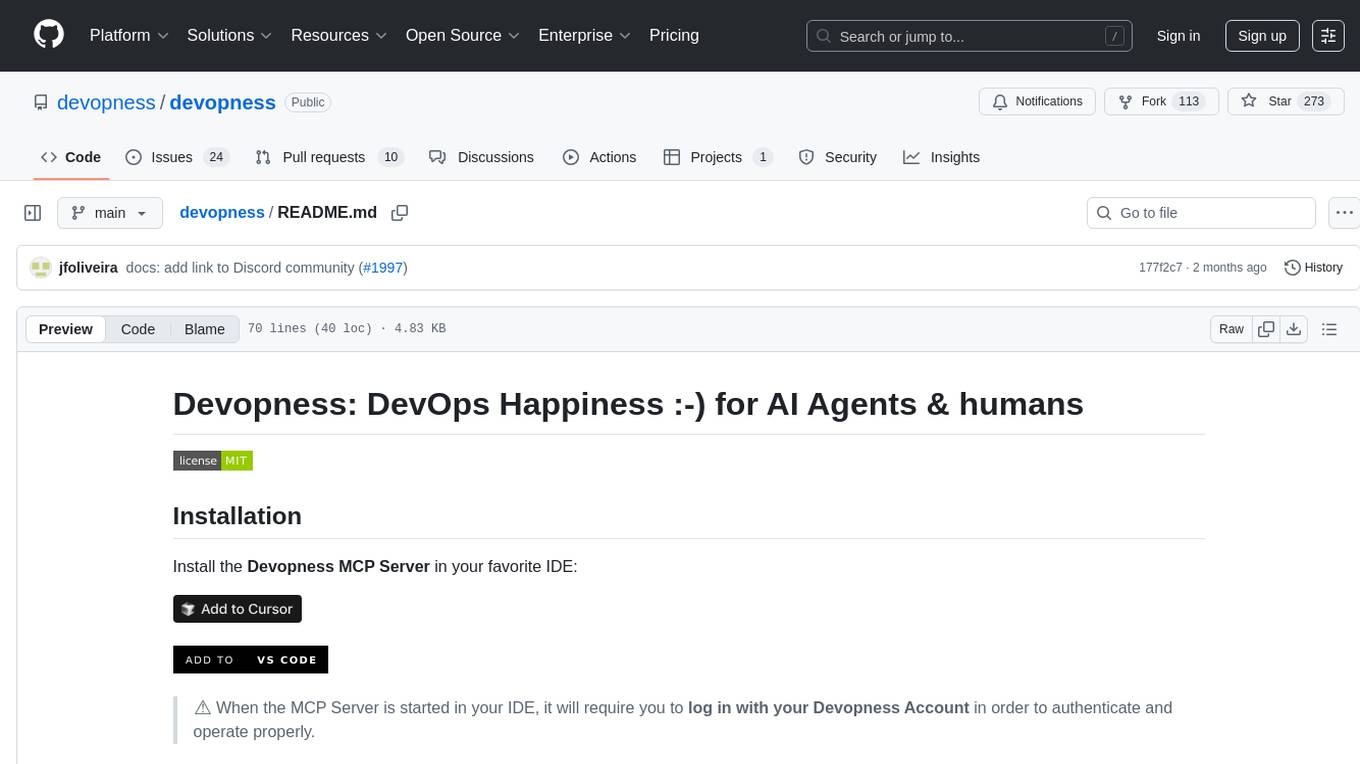
devopness
Devopness is a tool that simplifies the management of cloud applications and multi-cloud infrastructure for both AI agents and humans. It provides role-based access control, permission management, cost control, and visibility into DevOps and CI/CD workflows. The tool allows provisioning and deployment to major cloud providers like AWS, Azure, DigitalOcean, and GCP. Devopness aims to make software deployment and cloud infrastructure management accessible and affordable to all involved in software projects.
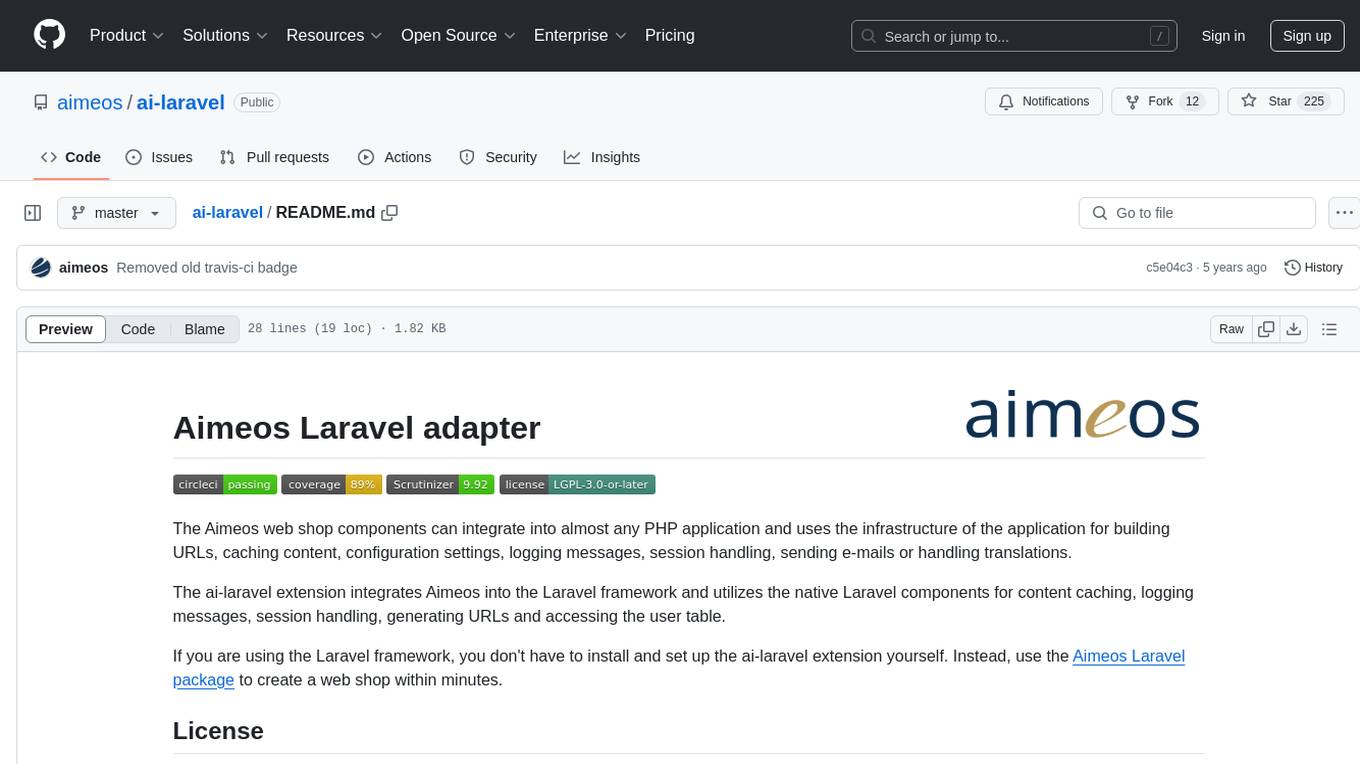
ai-laravel
The Aimeos Laravel adapter allows integration of Aimeos web shop components into Laravel framework, leveraging native Laravel components for content caching, logging messages, session handling, generating URLs, and accessing the user table. Users of Laravel can quickly set up a web shop using the Aimeos Laravel package, saving time and effort in installation and configuration. The adapter is licensed under LGPLv3 and offers seamless integration with Laravel infrastructure for various functionalities like URL building, caching, logging, session management, email sending, and translations.
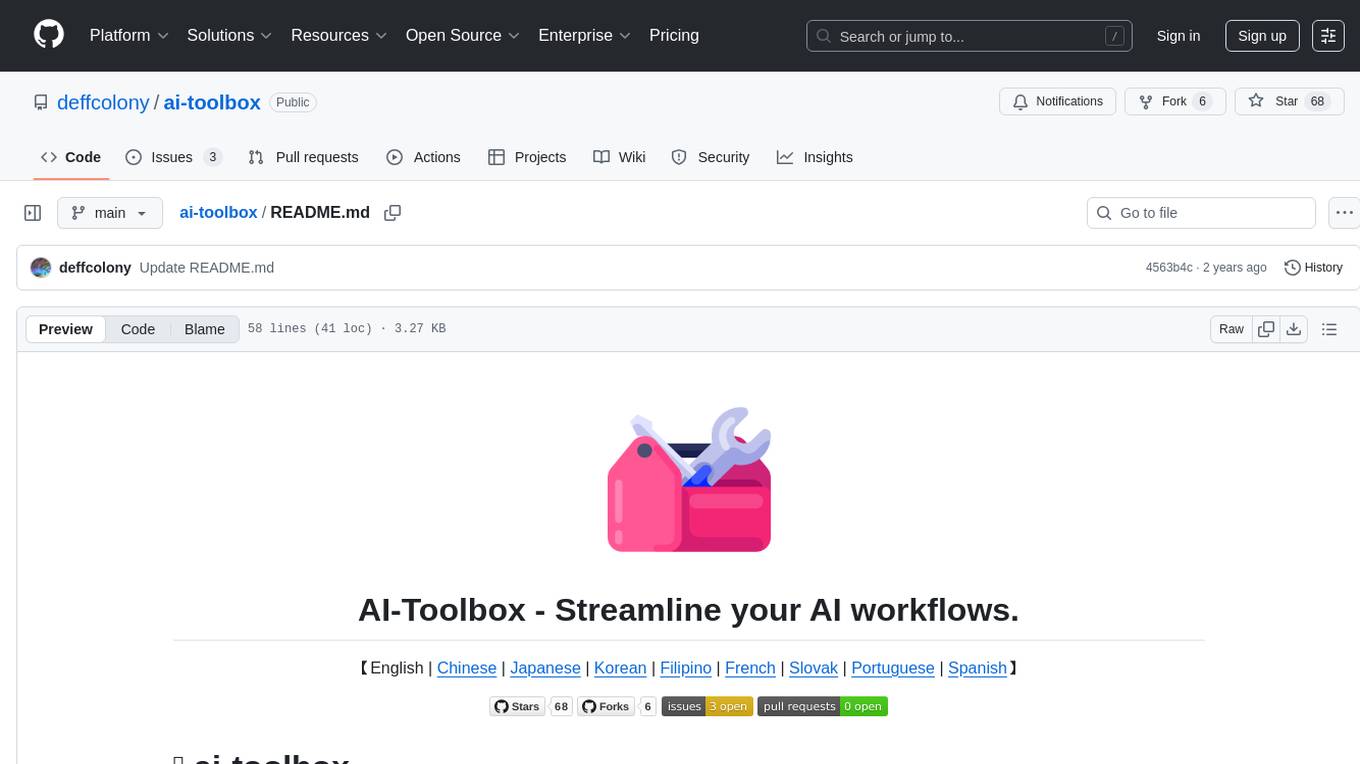
ai-toolbox
AI-Toolbox is a collection of automation scripts and tools designed to streamline AI workflows. It simplifies the installation process of various AI applications, making software deployment effortless for data scientists, researchers, and developers. The toolbox offers automated installation of multiple applications, customization for specific workflows, easy-to-use scripts, and receives regular updates and contributions from the community.
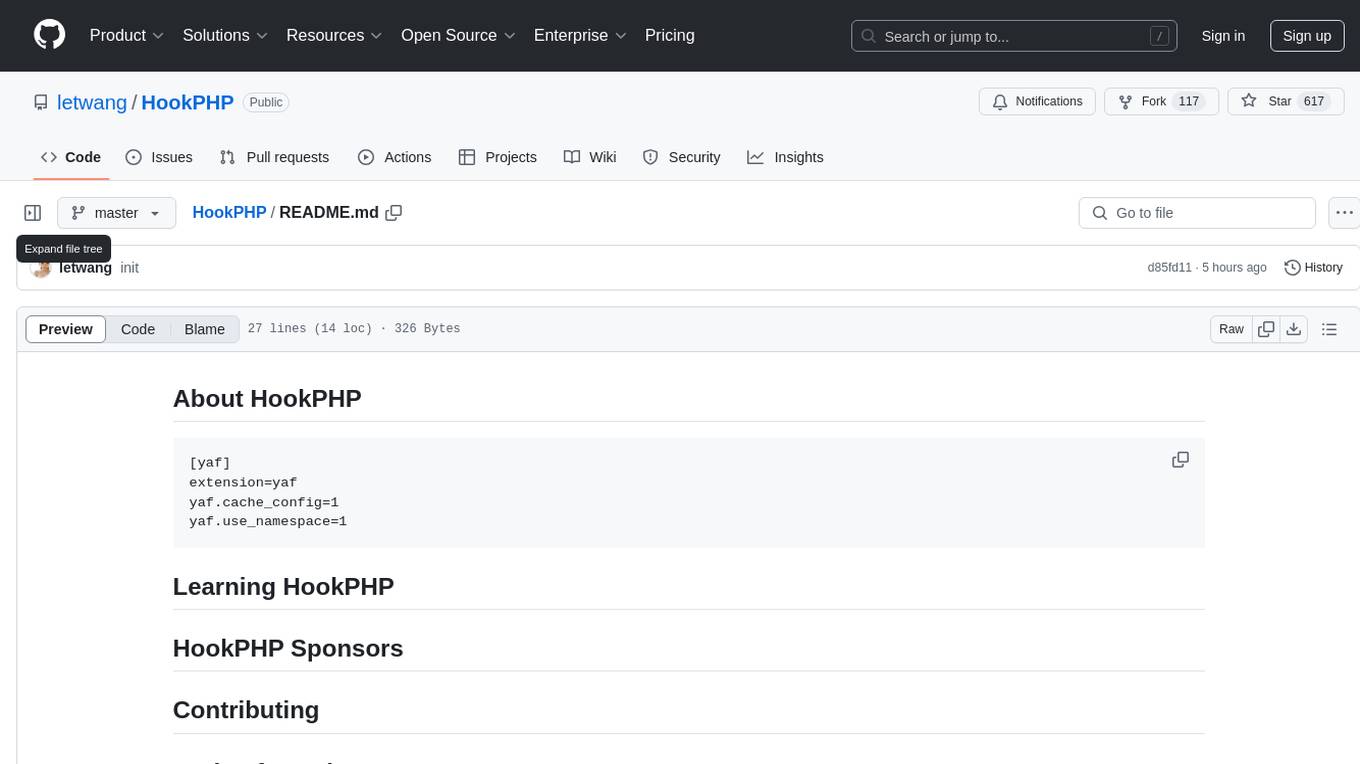
HookPHP
HookPHP is an open-source project that provides a PHP extension for hooking into various aspects of PHP applications. It allows developers to easily extend and customize the behavior of their PHP applications by providing hooks at key points in the execution flow. With HookPHP, developers can efficiently add custom functionality, modify existing behavior, and enhance the overall performance of their PHP applications. The project is licensed under the MIT license, making it accessible for developers to use and contribute to.
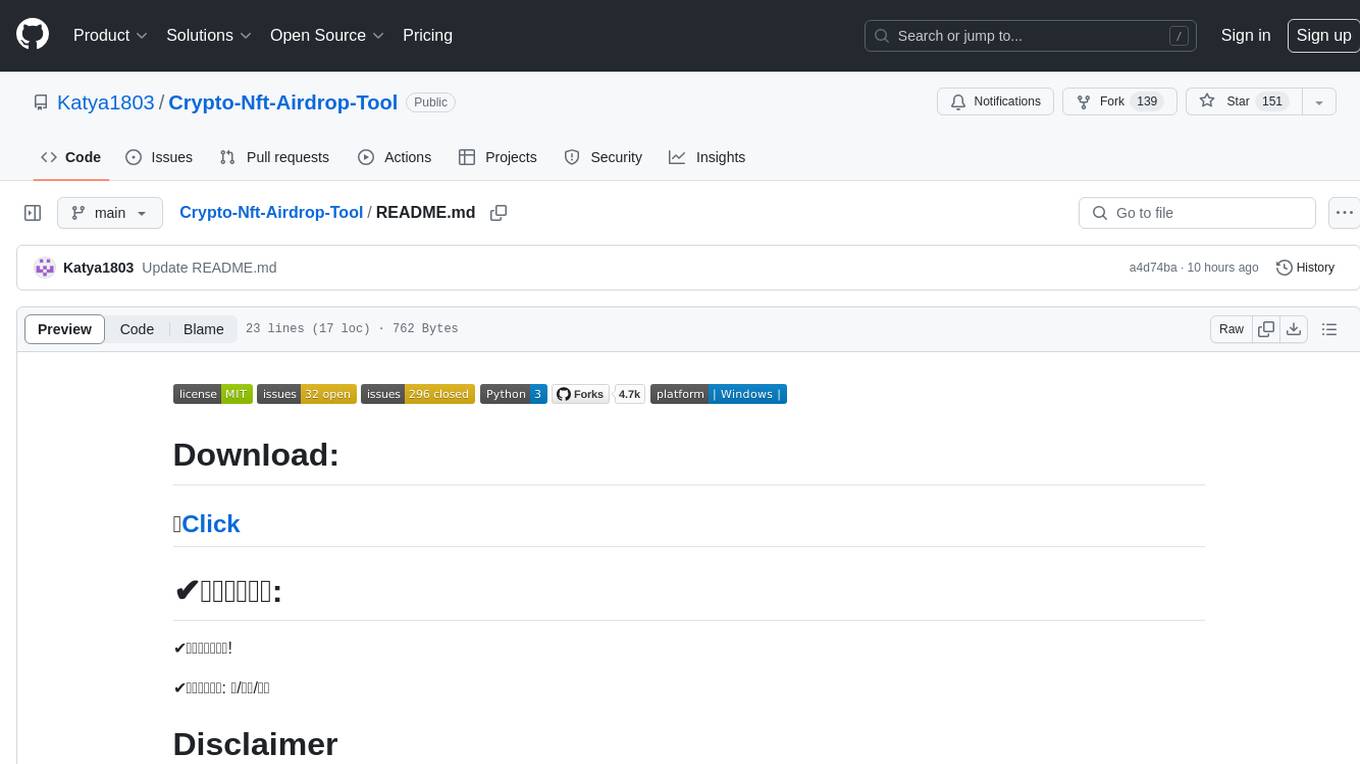
Crypto-Nft-Airdrop-Tool
Crypto-Nft-Airdrop-Tool is a Python tool designed for conducting airdrops of NFTs in the crypto space. It provides functionality for distributing NFTs to a specified audience efficiently. The tool is compatible with Windows platform and requires Python 3. Users can easily manage and execute airdrop campaigns using this tool, enhancing their engagement with the NFT community. The tool simplifies the process of distributing NFTs and ensures a seamless experience for both creators and recipients.
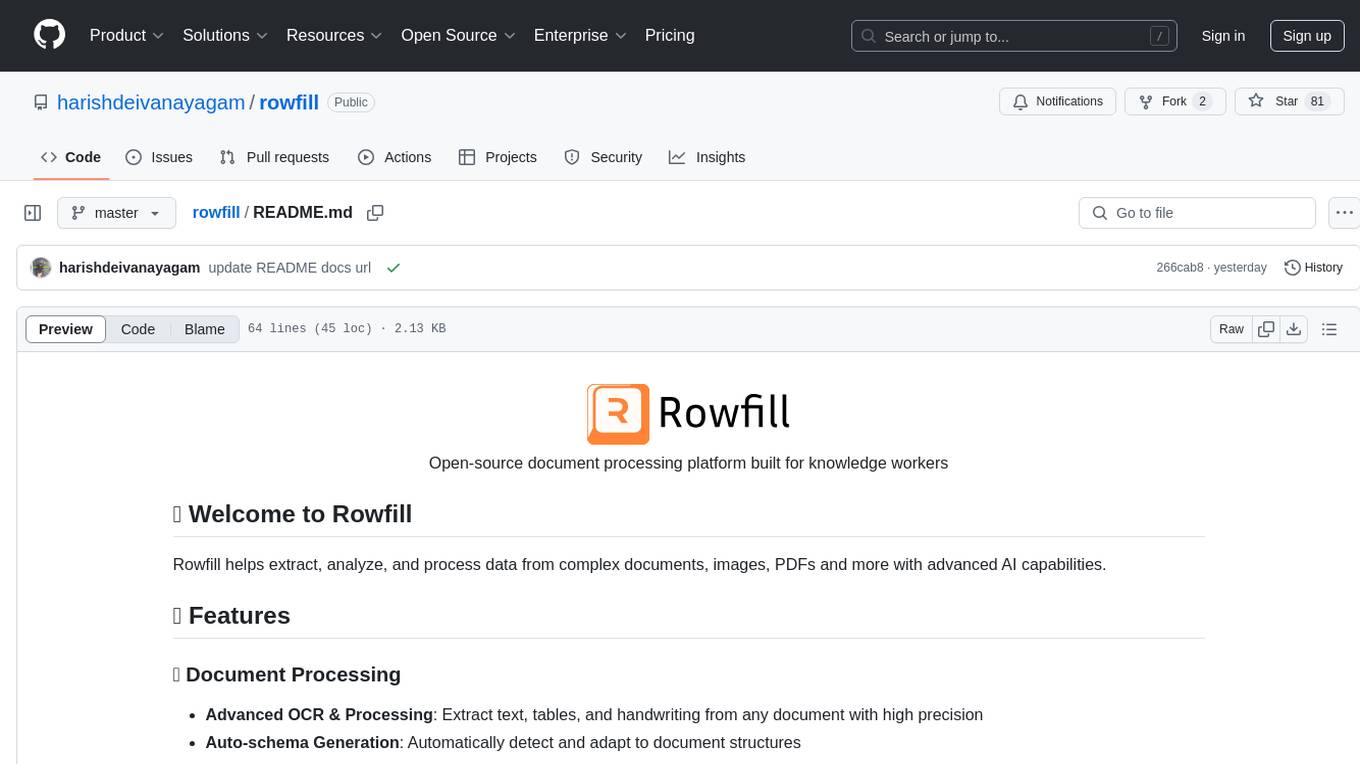
rowfill
Rowfill is an open-source document processing platform designed for knowledge workers. It offers advanced AI capabilities to extract, analyze, and process data from complex documents, images, and PDFs. The platform features advanced OCR and processing functionalities, auto-schema generation, and custom actions for creating tailored workflows. It prioritizes privacy and security by supporting Local LLMs like Llama and Mistral, syncing with company data while maintaining privacy, and being open source with AGPLv3 licensing. Rowfill is a versatile tool that aims to streamline document processing tasks for users in various industries.

devchat
DevChat is an open-source workflow engine that enables developers to create intelligent, automated workflows for engaging with users through a chat panel within their IDEs. It combines script writing flexibility, latest AI models, and an intuitive chat GUI to enhance user experience and productivity. DevChat simplifies the integration of AI in software development, unlocking new possibilities for developers.
For similar tasks

non-ai-licenses
This repository provides templates for software and digital work licenses that restrict usage in AI training datasets or AI technologies. It includes various license styles such as Apache, BSD, MIT, UPL, ISC, CC0, and MPL-2.0.
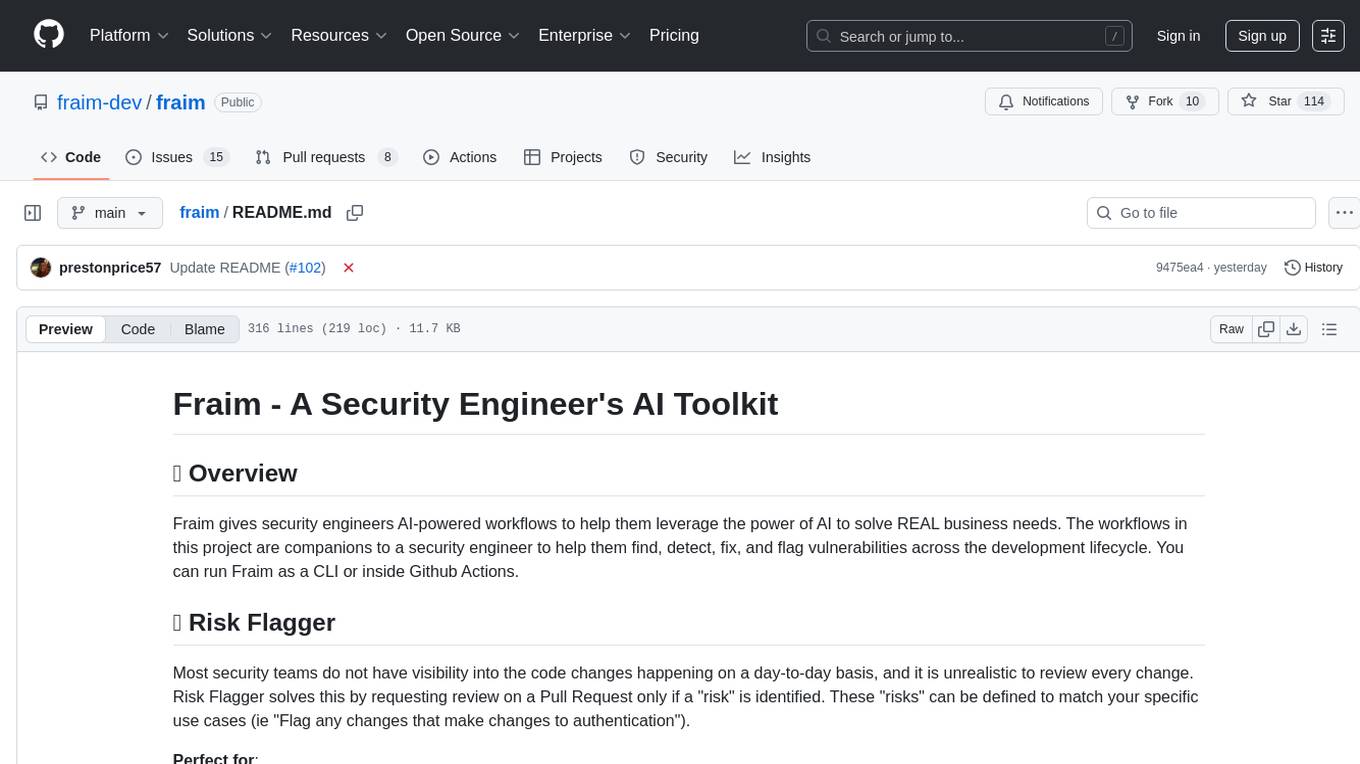
fraim
Fraim is an AI-powered toolkit designed for security engineers to enhance their workflows by leveraging AI capabilities. It offers solutions to find, detect, fix, and flag vulnerabilities throughout the development lifecycle. The toolkit includes features like Risk Flagger for identifying risks in code changes, Code Security Analysis for context-aware vulnerability detection, and Infrastructure as Code Analysis for spotting misconfigurations in cloud environments. Fraim can be run as a CLI tool or integrated into Github Actions, making it a versatile solution for security teams and organizations looking to enhance their security practices with AI technology.
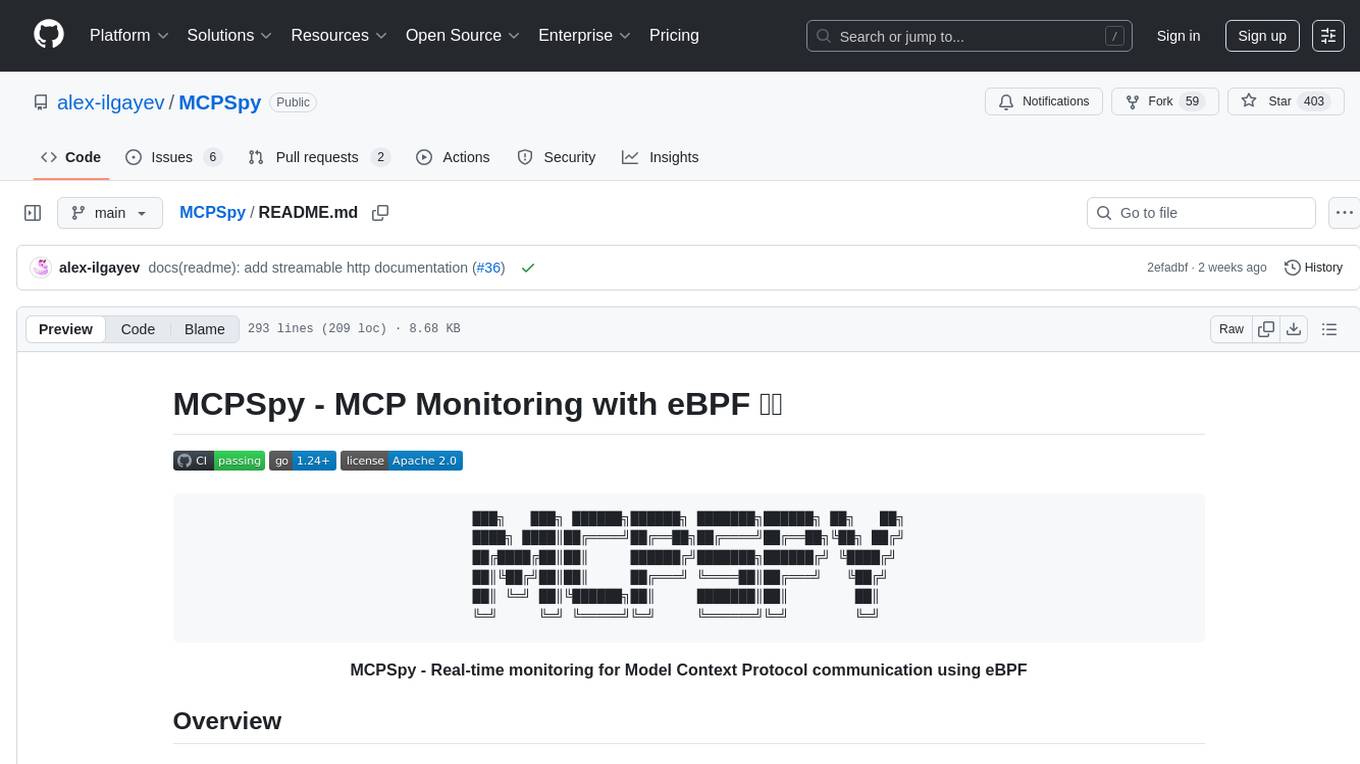
MCPSpy
MCPSpy is a command-line tool leveraging eBPF technology to monitor Model Context Protocol (MCP) communication at the kernel level. It provides real-time visibility into JSON-RPC 2.0 messages exchanged between MCP clients and servers, supporting Stdio and HTTP transports. MCPSpy offers security analysis, debugging, performance monitoring, compliance assurance, and learning opportunities for understanding MCP communications. The tool consists of eBPF programs, an eBPF loader, an HTTP session manager, an MCP protocol parser, and output handlers for console display and JSONL output.
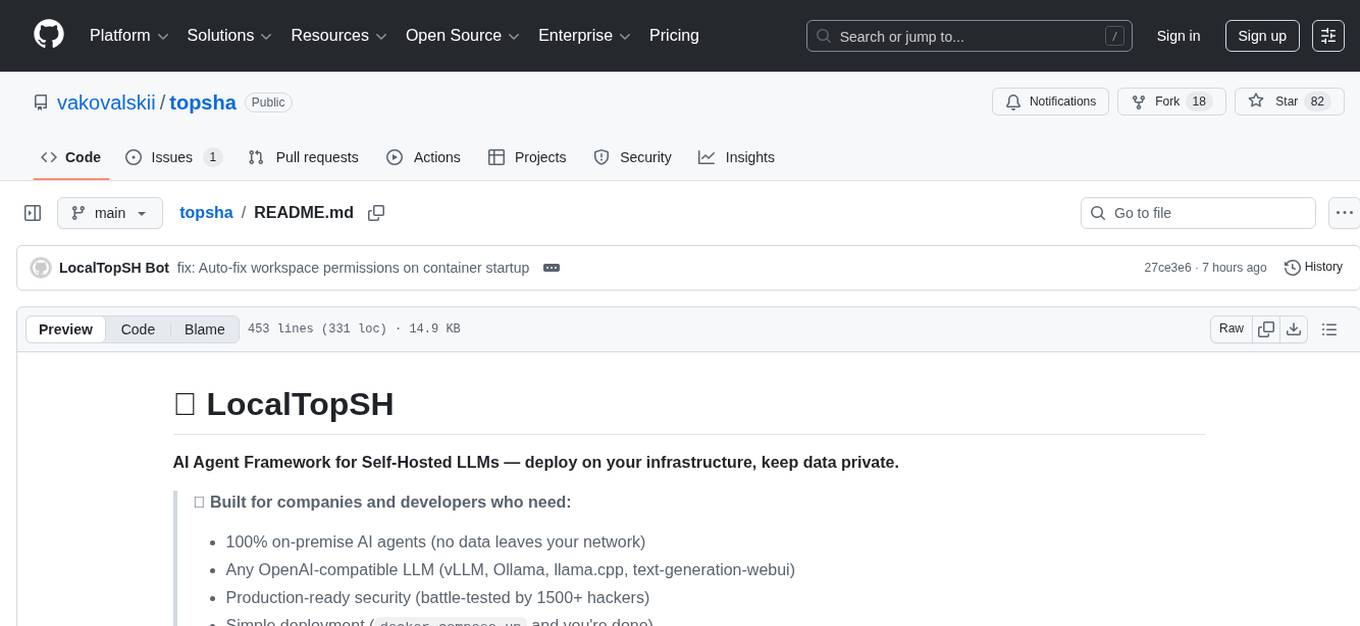
topsha
LocalTopSH is an AI Agent Framework designed for companies and developers who require 100% on-premise AI agents with data privacy. It supports various OpenAI-compatible LLM backends and offers production-ready security features. The framework allows simple deployment using Docker compose and ensures that data stays within the user's network, providing full control and compliance. With cost-effective scaling options and compatibility in regions with restrictions, LocalTopSH is a versatile solution for deploying AI agents on self-hosted infrastructure.
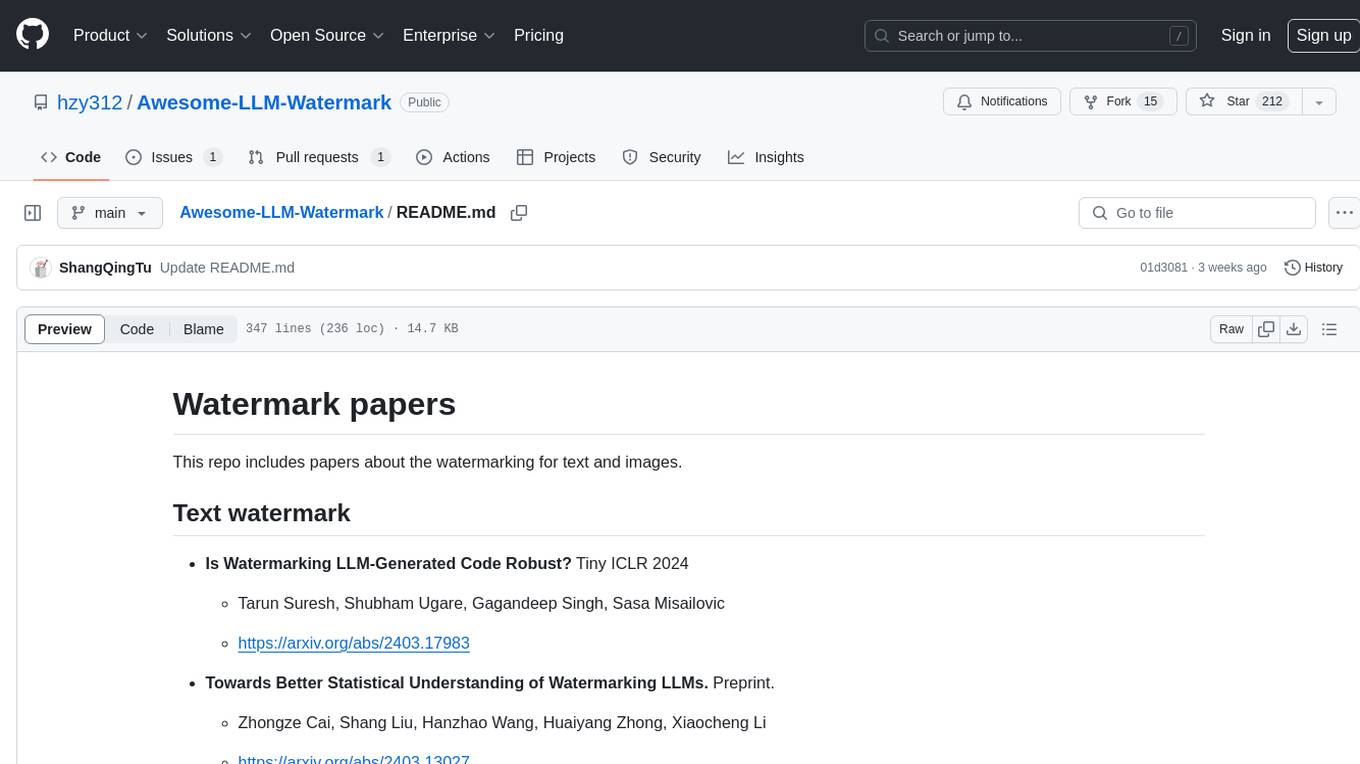
Awesome-LLM-Watermark
This repository contains a collection of research papers related to watermarking techniques for text and images, specifically focusing on large language models (LLMs). The papers cover various aspects of watermarking LLM-generated content, including robustness, statistical understanding, topic-based watermarks, quality-detection trade-offs, dual watermarks, watermark collision, and more. Researchers have explored different methods and frameworks for watermarking LLMs to protect intellectual property, detect machine-generated text, improve generation quality, and evaluate watermarking techniques. The repository serves as a valuable resource for those interested in the field of watermarking for LLMs.
For similar jobs

ciso-assistant-community
CISO Assistant is a tool that helps organizations manage their cybersecurity posture and compliance. It provides a centralized platform for managing security controls, threats, and risks. CISO Assistant also includes a library of pre-built frameworks and tools to help organizations quickly and easily implement best practices.
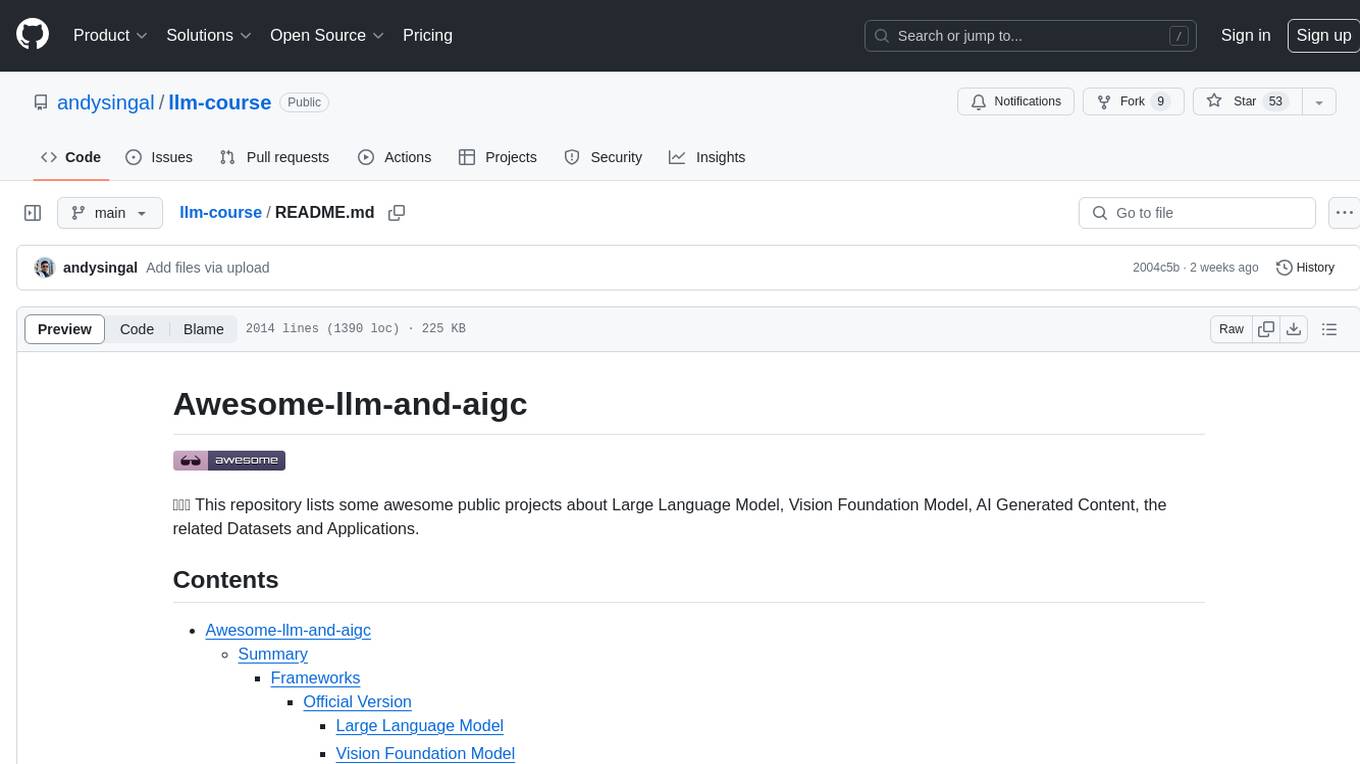
llm-course
The llm-course repository is a collection of resources and materials for a course on Legal and Legislative Drafting. It includes lecture notes, assignments, readings, and other educational materials to help students understand the principles and practices of drafting legal documents. The course covers topics such as statutory interpretation, legal drafting techniques, and the role of legislation in the legal system. Whether you are a law student, legal professional, or someone interested in understanding the intricacies of legal language, this repository provides valuable insights and resources to enhance your knowledge and skills in legal drafting.

non-ai-licenses
This repository provides templates for software and digital work licenses that restrict usage in AI training datasets or AI technologies. It includes various license styles such as Apache, BSD, MIT, UPL, ISC, CC0, and MPL-2.0.
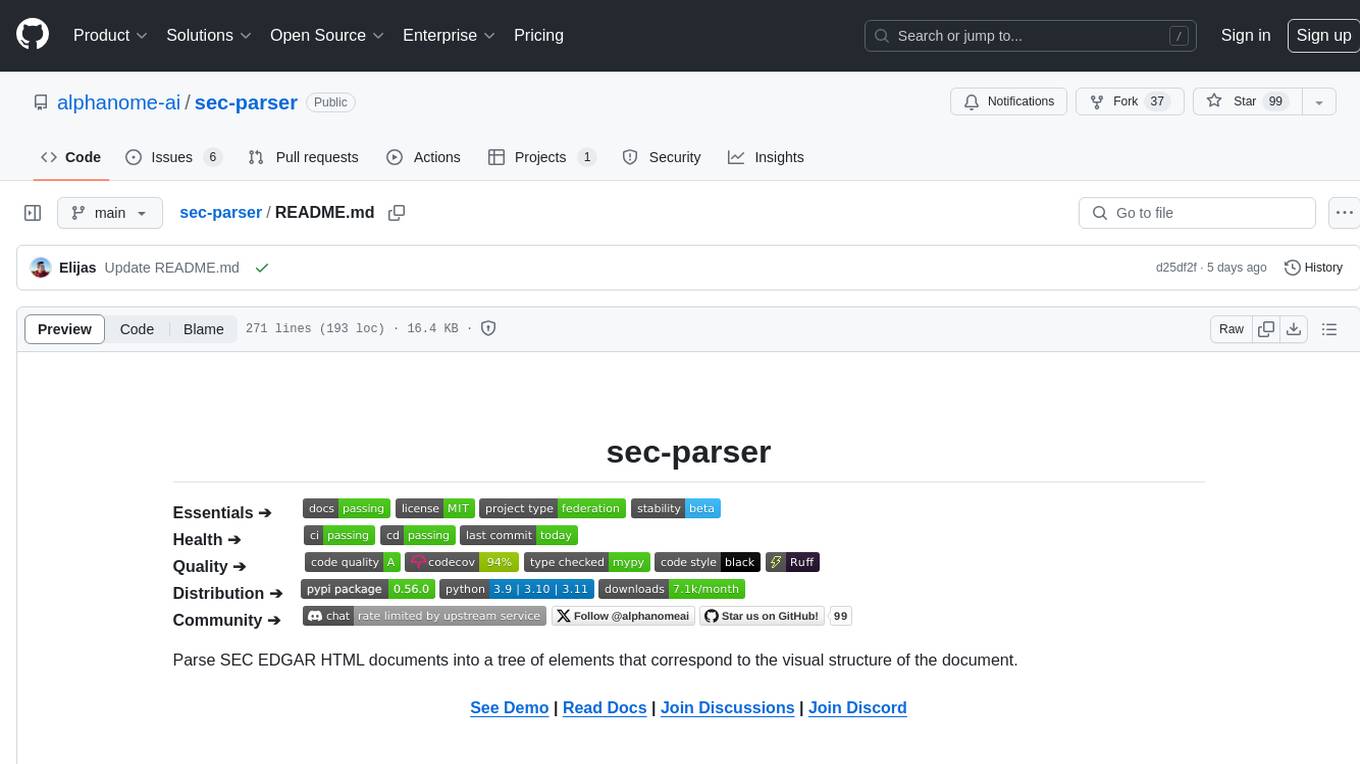
sec-parser
The `sec-parser` project simplifies extracting meaningful information from SEC EDGAR HTML documents by organizing them into semantic elements and a tree structure. It helps in parsing SEC filings for financial and regulatory analysis, analytics and data science, AI and machine learning, causal AI, and large language models. The tool is especially beneficial for AI, ML, and LLM applications by streamlining data pre-processing and feature extraction.
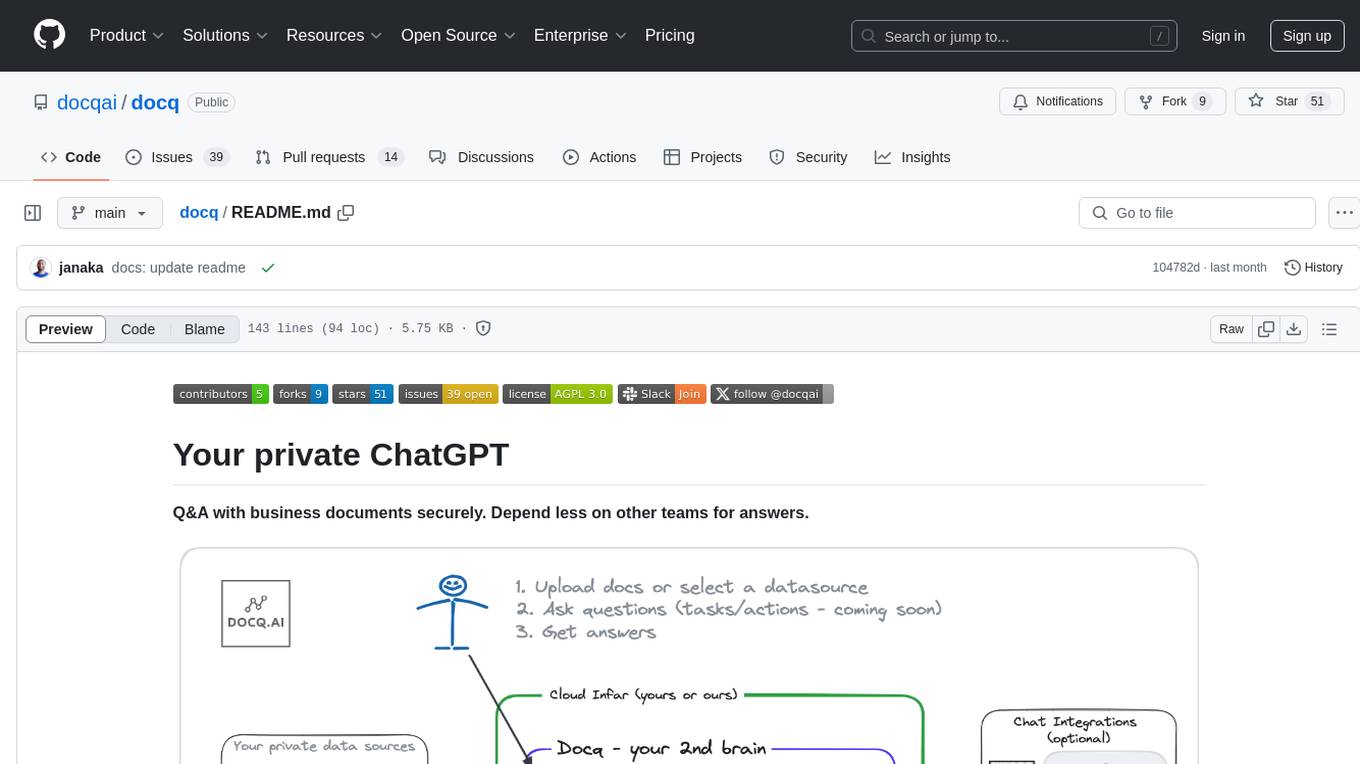
docq
Docq is a private and secure GenAI tool designed to extract knowledge from business documents, enabling users to find answers independently. It allows data to stay within organizational boundaries, supports self-hosting with various cloud vendors, and offers multi-model and multi-modal capabilities. Docq is extensible, open-source (AGPLv3), and provides commercial licensing options. The tool aims to be a turnkey solution for organizations to adopt AI innovation safely, with plans for future features like more data ingestion options and model fine-tuning.
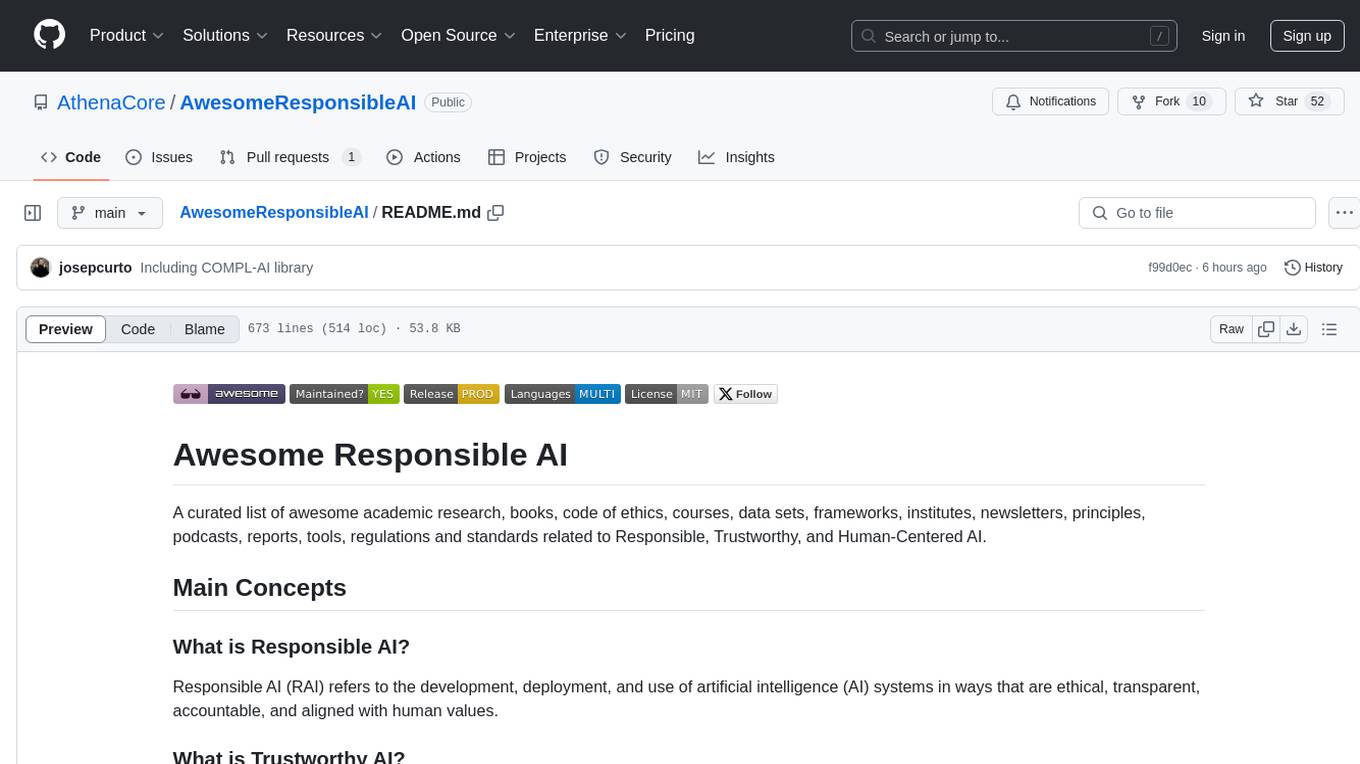
AwesomeResponsibleAI
Awesome Responsible AI is a curated list of academic research, books, code of ethics, courses, data sets, frameworks, institutes, newsletters, principles, podcasts, reports, tools, regulations, and standards related to Responsible, Trustworthy, and Human-Centered AI. It covers various concepts such as Responsible AI, Trustworthy AI, Human-Centered AI, Responsible AI frameworks, AI Governance, and more. The repository provides a comprehensive collection of resources for individuals interested in ethical, transparent, and accountable AI development and deployment.
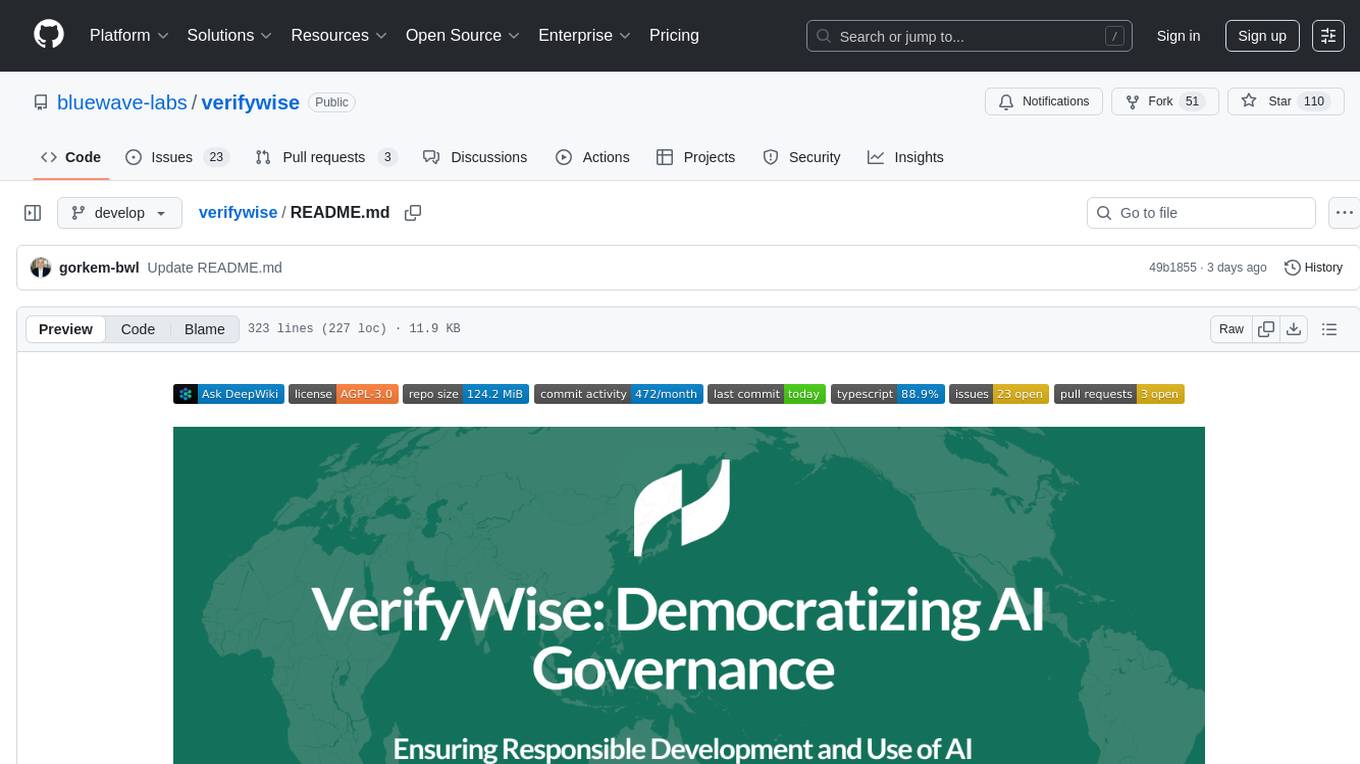
verifywise
VerifyWise is an open-source AI governance platform designed to help businesses harness the power of AI safely and responsibly. The platform ensures compliance and robust AI management without compromising on security. It offers additional products like MaskWise for data redaction, EvalWise for AI model evaluation, and FlagWise for security threat monitoring. VerifyWise simplifies AI governance for organizations, aiding in risk management, regulatory compliance, and promoting responsible AI practices. It features options for on-premises or private cloud hosting, open-source with AGPLv3 license, AI-generated answers for compliance audits, source code transparency, Docker deployment, user registration, role-based access control, and various AI governance tools like risk management, bias & fairness checks, evidence center, AI trust center, and more.
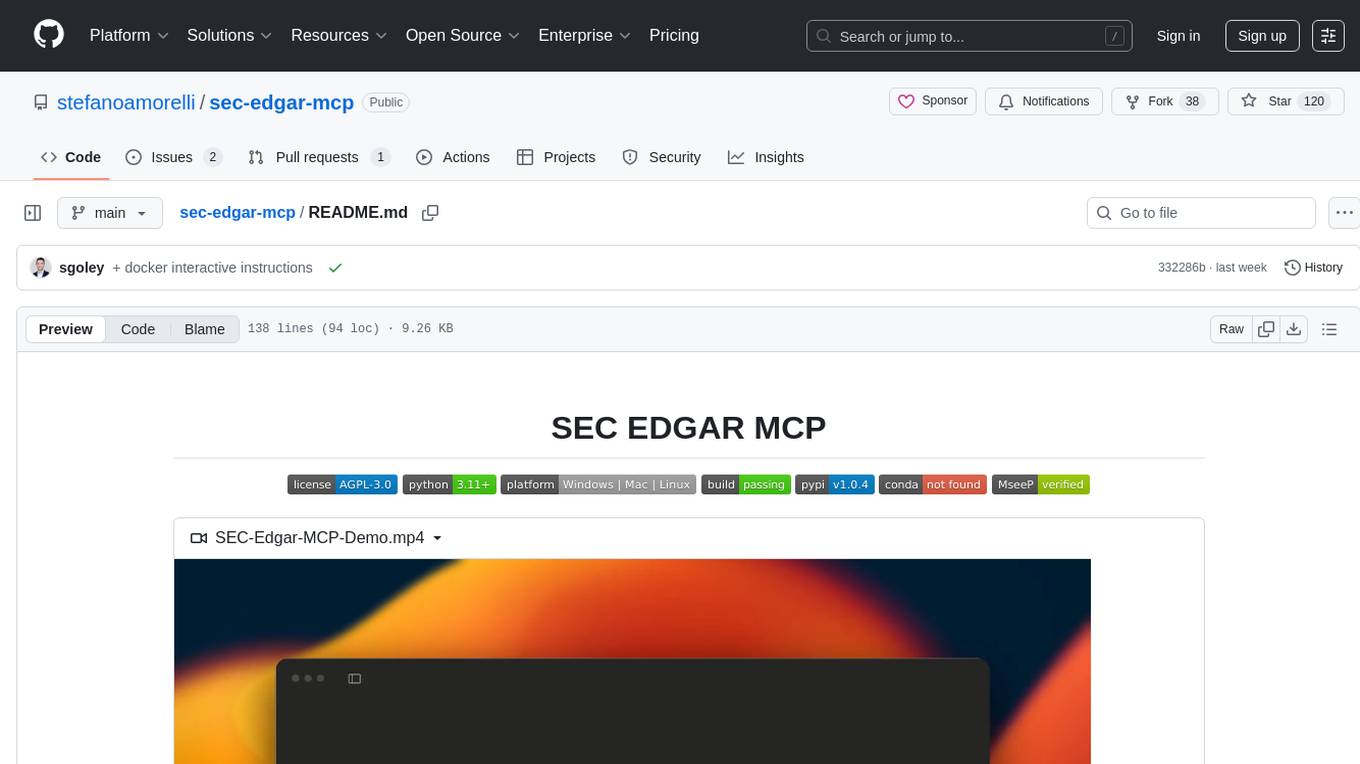
sec-edgar-mcp
SEC EDGAR MCP is an open-source Model Context Protocol (MCP) server that connects AI models to the rich dataset of SEC EDGAR filings. It provides tools for accessing SEC filing data, leveraging the EdgarTools Python library for fetching data from official SEC sources and performing direct XBRL parsing for financial precision. The server acts as a middleman between an AI client and the SEC's EDGAR backend, offering tools for company lookup, financial statements, insider transactions, and more. Responses are deterministic, maintain exact precision, and include clickable SEC URLs for verification.
